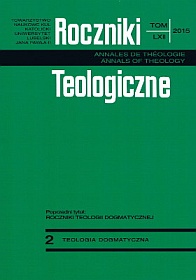Conversation as an Incarnation of the Word: on the Way Toward an (Im)possible Understanding
Abstract
In the center of Gadamer's philosophical hermeneutics is the experience of aconversation. Its decisive element is opening and listening to the Other. A conversation focused on what needs to be understood is happening in the dialectics of question and answer, and is transformed along with the partners of the conversation. A hermeneutic conversation can be understood as perichoresis. It makes us realize that conversation is the art of living and hermeneutic hospitality is its essential element. We find numerous valuable intuitions concerning the hermeneutic conversation in Plato's works and in Schleiermacher's “Christmas Eve: Dialogue on the Incarnation”. Searching for a proper word that could reach our interlocutor, we experience the inevitability of death. It remains a brutal dividing line that, at the same time, breaks the conversation. The horizon of death is the horizon of the hermeneutic conversation.
References
Augustinus, Sermo 288, 3: PL 1304-1306.
Augustinus, Sermo 293, 3: PL 1328-1329.
Gadamer H.-G., „Die Unfähigkeit zum Gespräch,” in: idem, Gesammelte Werke 2: Hermeneutik II. Wahrheit und Methode, 2 (Tübingen: Mohr 1986).
Gadamer H.-G., Hermeneutik: Wahrheit und Methode. Ergänzungen, Register, GW2 (Tübingen: Mohr 1986).
Gadamer H.-G., Wahrheit und Methode: Grundzüge einer philosophischen Hermeneutik, GW1 (Tübingen: Mohr 1990).
Gadamer H.-G., „The Scope of Hermeneutical Reflection,” in: idem, Philosophical Hermeneutics, ed. and trans. David E. Linge (Berkeley, Calif.: University of California Press 2008).
Greshake G., Der dreieineGott: Eine trinitarische Theologie (Freiburg i.Br.: Herder 2001).
Heidegger M., Brief über den Humanismus (Frankfurt a.M.: Vittorio Klostermann 1947).
Heidegger M., Was heißt Denken? Hrsg. P.-L. Coriando (Frankfurt a.M.: Vittorio Klostermann 2002).
Levinas E., Totality and Infinity: An Essay on Exteriority, trans. Alphonso Lingis(Pittsburgh, Pa.:Duquesne University Press 1969).
Renaud F., „Old and New in Gadamerian Hermeneutics: A Comparison between Gadamer and Olympiodorus”, in: Wiercinski (Hg), Gadamer's Hermeneutics and the Art of Conversation (Münster: LIT Verlag 2011), 513-528.
Ruchlak N., Das Gespräch mit dem Anderen: Perspektiven einer ethischen Hermeneutik(Würzburg: Königshausen & Neumann 2004).
Schleiermacher F., Die Weihnachtsfeier: Ein Gespräch (Zürich: Manesse 1989).
Tsikrikas Z., Jenseitsvon Phänomenologie und Dialektik: Das Heilige und Plötzliche bei Martin Heidegger (Göttingen: V & R unipress 2004).
Wiercinski A., „Ermeneutica filosofica della tradizione,” Ars Interpretandi: Annuario di ermeneutica giuridica 8 (2003), 21-40.
Wiercinski A., „Between Familiarity and Strangeness: Gadamerian and Derridian Hermeneutics of Friendship”, in: M. J. Cantista (ed.), Subjectividade e Racionalidade: Uma abordagem fenomenológico-hermenêutica (Porto: Campo das Letras 2006), 269-295.
Wiercinski A., „Hans-Georg Gadamer and the Truth of Hermeneutic Experience”, Analecta Hermeneutica (2009).
Wiercinski A., „Confusion of Voices: The Crucial Dilemmas of Being a Human Being, Czeslaw Milosz's Poetry, and the Search for Personal Identity”, in: B. Weber, K. Herb, P. Schweitzer, E. Marsal, T. Dobashi (Hg), Cultural Politics and Identity: The Public Space of Recognition (Münster: LIT Verlag 2011), 147-174.
Wiercinski A. (Hg), Gadamer's Hermeneutics and the Art of Conversation (Münster: LIT Verlag 2011).
Copyright (c) 2015 Roczniki Teologiczne

This work is licensed under a Creative Commons Attribution-NonCommercial-NoDerivatives 4.0 International License.





